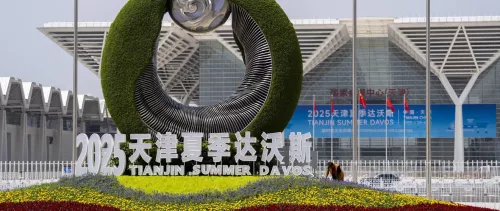
Thailand and Singapore have spearheaded cross-border connectivity between fast payment systems PromptPay and PayNow. Image: Getty Images/iStockphoto
This article is part of:Centre for Financial and Monetary Systems
- Southeast Asia is rapidly transitioning to a cashless digital economy, with many embracing e-payments and mobile wallets.
- Thailand and Singapore have spearheaded cross-border connectivity between fast payment systems PromptPay and PayNow.
- The World Economic Forum's Shaping the Future of Cross-Border Fast Payment Systems: Revolutionizing Transactions in South-East Asia report examines the move towards expanded cross-border connectivity.
Financial services are undergoing a digital revolution. As economies become increasingly digital, consumers expect their financial interactions to keep pace, demanding seamless, secure and rapid payment solutions.
The digital payments market is thus growing rapidly across countries, fuelled by the increasing adoption of contactless payments, e-wallets and e-commerce. In today’s real-time digital economy, customers and businesses need access to payment systems that are fast, affordable, accessible and reliable.
Thailand and Singapore have been at the forefront of linking domestic fast payment systems across borders. Their PromptPay and PayNow systems now enable instant, low-cost mobile transfers between the countries using just a recipient’s phone number.
This first-of-its-kind ASEAN cross-border linkage provides a blueprint for connecting real-time payment infrastructure across the region. The value of gross digital payments across the six largest ASEAN economies reached $806 billion in 2022, up 14% year on year, and is forecast to rise to close to $1.2 trillion by 2025.
The availability of smartphones and increased internet penetration have played central roles in the widespread adoption of online banking services, mobile money and e-wallets.
As illustrated below, account ownership within financial institutions has also taken a leap forward across ASEAN countries over the past decade. Account ownership or access to mobile money is now higher than 60% in seven out of the nine countries covered by the World Bank Findex, compared with only two countries in 2011.
Account ownership at a financial institution or with a mobile money service provider. Image: World Economic Forum
The number of people holding a bank account or signing up with a mobile money provider in that time has grown from 3% to 60% in Cambodia; from 9% to 62% in Lao People’s Democratic Republic; and from 12% to 62% in Indonesia.
The use of e-wallets is also rapidly gaining traction across ASEAN countries. As illustrated below, half of the top 10 countries in the world in terms of e-wallet penetration are Southeast Asian countries (Thailand, Viet Nam, the Philippines, Malaysia and Indonesia).
Global e-wallet adoption rates by country: top 10 countries by adoption rates (2022) Image: ACI Worldwide/World Economic Forum
The World Economic Forum's recent briefing paper Shaping The Future of Cross-Border Fast Payment Systems, released in collaboration with the Bank of Thailand, examines the rise of fast payment systems in Southeast Asia and the momentum towards expanded cross-border connectivity.
Using the landmark PromptPay-PayNow linkage between Thailand and Singapore as a case study, it highlights lessons learned to guide future cross-border payments linkages and make the vision of a unified seamless real-time payments infrastructure across Southeast Asia a reality.
Promptpay-Paynow cross-border linkage
Thailand and Singapore connected their PromptPay and PayNow fast payment systems in 2021. This pioneering linkage now allows individuals to make real-time, low-cost mobile payments using just the recipient's phone number.
Transfers that once took days now complete in minutes. The linkage enables individuals to make real-time and low-cost transfers of up to SGD 1,000/THB 25,000 (about $735/$695) daily between Thailand and Singapore using just the recipient’s mobile number.
As of mid-2022, the linkage was processing more than 65,000 cross-border transactions monthly, with transaction size averaging $150–200 per transfer. The fixed cost per transaction is currently THB 150 (+/- $4) in Thailand and is currently free to use in Singapore, although it includes a small foreign exchange markup defined by the participating bank issuing the transfer.
Before the establishment of the PromptPay-PayNow linkage, senders had to pay up to 10% of the amount sent to transmit money between the two countries, and it might take several working days for the money to arrive.
Moves towards regional integration on digital payments
As central banks across Southeast Asia lead the way to connect fast payment systems and improve interoperability, the realization of full regional digital integration is being fast-tracked.
In September 2023, ASEAN launched negotiations for a Digital Economy Framework Agreement during the latest ASEAN Summit in Jakarta, which will enhance how the region cooperates on digital trade, cross-border e-commerce, and digital payments among other key priorities.
ASEAN countries are also working with the Bank for International Settlements' on Project Nexus, a platform with provides a model for regional payments integration. By establishing common standards and a shared platform, domestic systems gain reach to all participants, avoiding the need for custom bilateral links. Thailand, Malaysia, Singapore, Indonesia and the Philippines aim to connect their fast payment systems with Nexus.
Integrating real-time payments regionally is challenging but achievable with collaboration, vision and sustained commitment from stakeholders of payments ecosystems. Cross-border real-time connectivity has immense potential to accelerate financial access, empower societies and improve lives across ASEAN.


